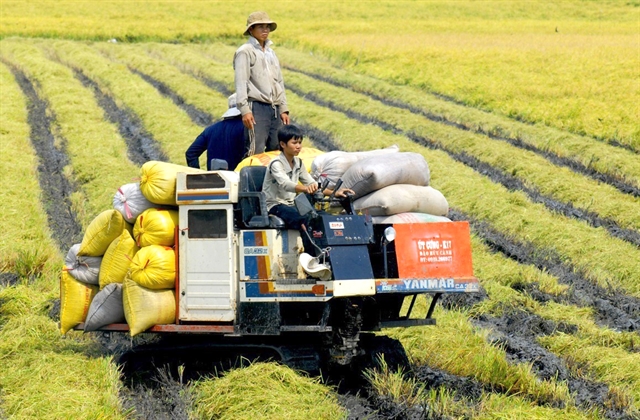
AN GIANG — The Cửu Long (Mekong) Delta province of An Giang plans to take comprehensive steps including research, evaluation and application of advanced technologies to develop its own rice brand.
It targets that branded produce makes up 10 per cent of its rice exports by 2030.
In terms of volume, it targets exports of 45,000-50,000 tonnes of An Giang brand rice in 2025 and for this to rise to 100,000 tonnes in 2030.
The exports will focus on large and demanding markets like the US, the EU, Japan, South Korea, China and the Philippines.
The province also plans that by 2025, about 5,000 tonnes of An Giang brand rice will be sold at domestic super markets, traditional markets and popular tourism areas; and be served by restaurants and hotels in large cities like Hà Nội and HCM City. This will be increased to about 10,000 tonnes in 2030.
A major aim is to develop the An Giang rice brand into a national rice brand.
Nguyễn Sỹ Lâm, director of the province’s Department of Agriculture and Rural Development, said the plan will be implemented into two phases.
In the first phase in 2022-25, the province will choose some “exemplary companies” to participate in building the An Giang rice brand, giving priority to those that have their own rice growing areas, have the capacity to cultivate rice varieties that will be used to develop the brand.
The companies must also have the capacity to process rice for export and be experienced in organising and participating in trade promotion activities at home and abroad.
The province will choose particular rice varieties for cultivation after researching their quality and evaluating their market potential.
It will also select suitable growing areas for each rice variety chosen to develop the provincial brand.
The rice that gets the An Giang brand licence will be processed, packaged and labelled in accordance with standard regulations and the quality management systems of imported markets.
Seed selection, cultivation
In the second phase, 2026-30, the plan will be expanded to all rice companies in the province.
To effectively implement the plan, the provincial agriculture department will boost research and application of advanced science and technology in rice seeds selection, cultivation, processing and trade promotion.
It will also carry out research towards creating new rice varieties and select those that meet the requirements of yield and quality.
The department will establish quality criteria for the An Giang rice brand as well as cultivation methods to be followed for each variety that will carry the brand name.
The quality of An Giang brand rice varieties will be evaluated once every two years.
The province will reorganise rice production to ensure stable quality and give priority to cultivation models that have strong linkages among stakeholders in production and consumption.
It will zone areas for growing An Giang brand rice and prioritise development of farming areas that grow two crops a year.
It will set out the stages of processing rice for meeting domestic and international standards and support “deep processing” for rice-related products.
In the first quarter of this year, the province exported 131,360 tonnes of rice worth US$70.76 million, up 1.2 per cent in volume and 2.4 per cent in value against the same period last year, according to its Department of Industry and Trade.
Linkage development
An Giang, one of the delta’s largest rice producers, has worked over the years to strengthen links between farmers and companies in rice production and consumption.
Such linkages have helped farmers access advanced farming techniques, have stable outlets and prices for their produce while companies receive quality rice that meet domestic and export market requirements.
For instance, farmer Đoàn Văn Thu in Châu Phú District’s Bình Long Commune has contracted with the Lộc Trời Group Joint Stock Company to grow high quality rice in his 4ha field for more than three years.
His rice has a guaranteed outlet and purchase price of VNĐ50-100 a kilogramme higher than the market price.
“When contracting with a company, farmers have to grow rice under cultivation stages instructed by the company to ensure quality. In return, the company ensures farmers always make profits,” he said.
Lâm, director of the provincial agriculture department, said that to promote such linkages, the province had to remove many hurdles in the way of attracting investment into agriculture production.
It also boosted the development of several linkage models to meet the requirements of quantity and export quality standard.
In the 2016-20 five year period, about 20 rice companies established contractual links with farmers.
For the 2021-22 winter-spring rice crop, about 15 companies signed contracts with rice farmers for cultivation on 115,100ha, nearly 50 per cent of the province’s zoned area for the crop.
These arrangements enable farmers to reap the economies of scale, smart farming and other effective models.
The smart rice farming model includes the use of machines for sowing seeds and transplanting seedlings as well as other machinery for irrigating rice fields.
It offers high profits, adapts well to climate change and is environmentally friendly, officials claim.
The model is being applied widely in the delta with the Ministry of Agriculture and Rural Development promoting it in co-operation with the Bình Điền Fertiliser Joint Stock Company.
The ministry is also developing on a pilot basis standard rice farming areas for exports on a total area of 50,000ha in An Giang and Kiên Giang provinces. — VnExpress News
- Reduce Hair Loss with PURA D’OR Gold Label Shampoo
- Castor Oil Has Made a “Huge” Difference With Hair and Brow Growth
- Excessive hair loss in men: Signs of illness that cannot be subjective
- Dịch Vụ SEO Website ở Los Angeles, CA: đưa trang web doanh nghiệp bạn lên top Google
- Nails Salon Sierra Madre
 VnExpress News The News Gateway of Vietnam
VnExpress News The News Gateway of Vietnam





